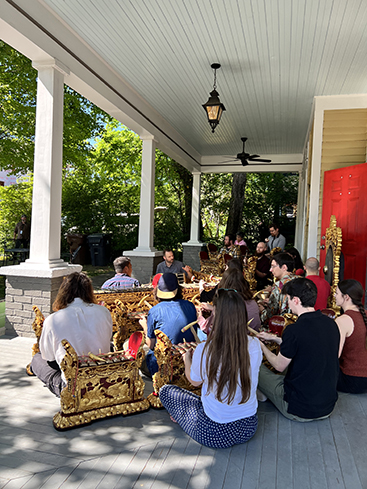Welcome to the UT Musicology area!
Musicology at the University of Tennessee encourages students to explore music as a cultural, historical, and global force. Through rigorous study, critical thinking, and independent research, students learn to understand music in context, and to use that knowledge to shape meaningful, informed careers in music and beyond.
Whether you’re preparing for graduate study, law school, museum or library work, or careers in teaching, journalism, or non-profits, musicology offers the intellectual and research foundation you need to succeed.

Academic Programs
Music, BA – Concentration in Music and Culture
An innovative interdisciplinary degree ideal for students interested in music history, ethnomusicology, and interdisciplinary work.
Musicology Minors
Music & Culture Minor: Open to all UT students, this minor offers focused study in musicology and complements majors across campus.
Interdisciplinary Minors: Music & Appalachia, Music & Asia, or Music & the African Diaspora
Each minor provides a focused exploration of specific musical traditions, combining academic coursework with performance and cultural engagement.
Music, MM – Concentration in Musicology
This program emphasizes the study of music in its social, intellectual, and global contexts. Students benefit from mentoring, independent research, and strong placement into further academic and professional opportunities.
Meet the Faculty
Dale Disney
Teaching Assistant Professor of Musicology, Coordinator of Online Programs
- Understand music in its historical, cultural, and social contexts
- Strengthen your writing, research, and critical thinking skills
- Prepare for graduate work in musicology, law, museum studies, or library sciences
- Explore diverse musical traditions and global perspectives
- Build your resume with independent research, collaboration, and academic presentations
- Contribute to music-related outreach, activism, and nonprofit work
- Tailor your path through flexible, interdisciplinary curricula

Explore Global Music Through Ensemble Participation
While not required, many Musicology students choose to enrich their studies by participating in globally focused performance ensembles. These groups offer hands-on, culturally immersive experiences that deepen your understanding of the music you explore in the classroom.
Opportunities include:
- Balinese Gamelan Ensemble
- Appalachian String Band
- Music of the African Diaspora Ensemble
Participation in these ensembles is open to all students and can be a valuable way to experience musical traditions in practice, develop cultural awareness, and strengthen your connection to specific research interests or communities.
These experiences are especially beneficial for students interested in ethnomusicology, cultural outreach, or performance-based research—but they’re available to anyone curious about global music-making.
Interested in UT Musicology?
Schedule a Music Major for a Day Experience or Building Tour!
Get a true sense of what it’s like to be a music major at UT! Sit in on classes, attend rehearsals, meet with the musicology professors, and tour our beautiful facilities.
Learn How To Apply
Whether you’re applying as a first-time college student, transfer student, or graduate student, admission to the Natalie L. Haslam College of Music is a multi-step process that includes applying to the University of Tennessee and to our college. We’re here to guide you every step of the way.
Graduate Teaching Assistantships
The Natalie L. Haslam College of Music offers a number of graduate teaching assistantships each academic year.
Assistantships carry a waiver of the university tuition, pays for mandatory university fees, medical coverage, and carries a monthly stipend.
